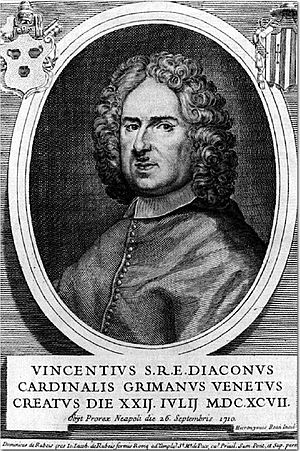Vincenzo Grimani facts for kids
Vincenzo Grimani was an important Italian figure who lived from 1652 (or 1655) to 1710. He was a cardinal, which is a high-ranking official in the Catholic Church. He was also a diplomat, meaning he represented his country in other nations. On top of that, he wrote stories for operas, known as a librettist.
Early Life and Opera Work
Vincenzo Grimani was born in Italy, either in the city of Venice or Mantua. He became well-known for writing the story, or "libretto," for a famous early opera by George Frideric Handel. This opera was called Agrippina.
He also wrote libretti for other operas. These included Elmiro re di Corinto by Carlo Pallavicino and Orazio by G. F. Tosi. All these operas were shown at the Teatro S Giovanni Grisostomo. Vincenzo Grimani owned this theater. His family also owned several other opera houses in Venice.
Political Career and Diplomacy
Vincenzo Grimani was very involved in politics. He supported the Habsburg family, who were a powerful royal family in Europe. Because of his strong support and his important work as a diplomat for the Habsburgs, he was made a cardinal in 1697. This was a very high honor.
Later, in 1708, he received another important position. He became the viceroy of Naples. A viceroy is like a governor who rules a region on behalf of a king or queen. He lived in Naples until he passed away.
His Opera Stories
Vincenzo Grimani's opera stories were quite different from those written by later famous librettists like Metastasio and Apostolo Zeno. Their stories often focused on teaching moral lessons. Grimani's libretto for Agrippina was known for being more about clever plots than strict morals.
In his operas, the songs, called "arias," were very important. They often took center stage over the spoken parts, known as "recitatives." Some people thought that his portrayal of the Emperor Claudius in Agrippina might have been a subtle way to criticize Pope Clement XI. Grimani often disagreed with Pope Clement XI while trying to protect the interests of the Habsburgs at the Vatican.
See also
 In Spanish: Vincenzo Grimani para niños
In Spanish: Vincenzo Grimani para niños
 | Precious Adams |
 | Lauren Anderson |
 | Janet Collins |


